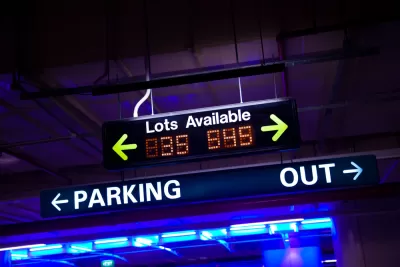The paper of record in Southern California is on the record in support of parking reforms.

The Los Angeles Times Editorial Board published support for a new approach to planning and development in Southern California that prioritizes people over cars. Specifically, the editorial supports the elimination of parking requirements, as proposed in two bills under consideration by the California State Legislature, AB 2097 and SB 1067.
Jurisdictions throughout Los Angeles County, a symbol of automobile dependency and car-centric planning, have spent decades building more parking than anything else. According to the editorial, “In Los Angeles County, there are more than 19 million parking spaces, almost two per resident, including children, according to a 2015 analysis. The county has dedicated more space to the storage of cars than it has lane miles of streets and roads.
The article also includes a description of each of the bills. AB 2097 “would eliminate parking requirements for commercial projects and residential developments with 40 or fewer units that were within a half mile of a major transit stop,” for example.
The second bill, SB 1067, is authored by Senate Appropriations Committee chair, Sen. Anthony Portantino (D-La Cañada Flintridge), who killed parking reform legislation, AB 1401, from last year’s legislative session. Portantino took the fury from transit and housing advocates in response to that decision to heart, according to the editorial, and has now proposed a bill that “would prohibit cities from imposing parking requirements on housing developments within a half-mile of a major transit stop if the project includes 20% affordable housing or the developer can show the project wouldn’t negatively affect parking in the area or achieving the localities’ affordable housing development targets.”
According to the assessment of the editorial, AB 2097 is a more ambitious reform. “[SB 1067] gives cities more discretion to maintain parking requirements than [AB 2097’s] approach.” Portantino’s bill also would not apply to commercial buildings.
FULL STORY: Editorial: California should prioritize housing people, not cars

Alabama: Trump Terminates Settlements for Black Communities Harmed By Raw Sewage
Trump deemed the landmark civil rights agreement “illegal DEI and environmental justice policy.”

Planetizen Federal Action Tracker
A weekly monitor of how Trump’s orders and actions are impacting planners and planning in America.

The 120 Year Old Tiny Home Villages That Sheltered San Francisco’s Earthquake Refugees
More than a century ago, San Francisco mobilized to house thousands of residents displaced by the 1906 earthquake. Could their strategy offer a model for the present?

In Both Crashes and Crime, Public Transportation is Far Safer than Driving
Contrary to popular assumptions, public transportation has far lower crash and crime rates than automobile travel. For safer communities, improve and encourage transit travel.

Report: Zoning Reforms Should Complement Nashville’s Ambitious Transit Plan
Without reform, restrictive zoning codes will limit the impact of the city’s planned transit expansion and could exclude some of the residents who depend on transit the most.

Judge Orders Release of Frozen IRA, IIJA Funding
The decision is a victory for environmental groups who charged that freezing funds for critical infrastructure and disaster response programs caused “real and irreparable harm” to communities.
Urban Design for Planners 1: Software Tools
This six-course series explores essential urban design concepts using open source software and equips planners with the tools they need to participate fully in the urban design process.
Planning for Universal Design
Learn the tools for implementing Universal Design in planning regulations.
Clanton & Associates, Inc.
Jessamine County Fiscal Court
Institute for Housing and Urban Development Studies (IHS)
City of Grandview
Harvard GSD Executive Education
Toledo-Lucas County Plan Commissions
Salt Lake City
NYU Wagner Graduate School of Public Service




























